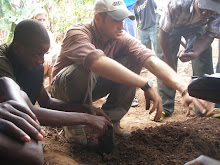The teaching was finished for us, so it was a great day for us to just sit back and watch the students have fun together. It's great to see after just 4 days together, how close the students who come from all over the Northern region have become. On the matola ride to Livingstonia I watched the students laughing and singing as they held onto each other for dear life as the truck hurled up and down the hills of the Phoka valley. Between songs Shadreck would lead the group in screaming random cheers like “Nyika camp is so beautiful!” or “Mr. Dan Ho-Yeaaaa!”We were entertained by Shupe Mzembe's sassy facial expressions as she reacted to every cheer before she buried her laughing face into her new friend Leah's shoulder. The truck driver had to make a stop at the Livingstonia hospital to pay a debt, while we waited Juma Nkhoma one of the smallest boys in the camp spotted some beautiful college aged nursing students, and reluctantly approached them with the encouragement of his friends. We all watched with great anticipation and cheered wildly when he managed to earn a smile from the very professional looking young women, and came running back with a smile of triumph.
Our first stop in Livingstonia was the beekeepers cooperative where the students learned about processing and marketing honey. We then went over to the old stone house museum for some history since it was the first time all of the students had been to Livingstonia aside for the three youth councilors who were with us last year. We took lunch at an overlook over Manchewe Falls. It was a great way to enjoy beans and rice, with the 300 foot plus waterfall on our left and the stretching lake shore below and the escarpment climbing up on our right,.
After lunch we visited the home of Leeza Dupree an expert in Permaculture design, Her assistant Alex gave us a detailed tour of the entire garden which contained many plants the students didn't know, but also many they knew very well, and planted themselves but never inter-cropped with so many different things. The main thing they all noticed was the abundance of perennial trees and crops that don't need replanting every season but continuously provide food so long as they are cared for.
From there we went to visit a similar farm of a Malawian women named Nya Bwindee who also relies on perennial crops like coffee trees, and Pineapple bushels. In fact her farm has over 2,800 pineapples, if they are sold at an average of 100MK, she's making a pretty impressive annual income from something she doesn't have to recultivate each season....sure beats tobacco. She originally acquired the land for free because everybody said that it's rocky soil and steep hillsides are useless, so she covered those hills with apple, peach, and lemon trees that provide a steady income as each different fruit comes into season. I think her place was one of the most useful sites we visited for the students, it really shows how anybody can make a good living from the land if they work hard and are willing to think outside of the box a little.
The whole idea of the camp was to bring the brightest and most interested wildlife club members together from all around Nyika and provide them with some useful skills and get them thinking about how they can live more in harmony with their land instead of degrading it. Hopefully they will take what they have learned back to their home communities and the ideas continue to spread.
The last morning as students were loading up on a Matola to head back to their various homes Atupele came running up to me with a folded up piece of paper; it was the poem she had read at the talent show, it cracks me up and deeply touches me all at once, here it is:
Bye, bye Dan
The night sky I have observed
The seven sisters not brothers
In the sky I have known and
I will not forget them.
Bye, bye Davie
How to plan I have known
Good record keeping I will do
The good work you have done
No one can believe it.
Bye, bye Mathias
Grafting crops I have known
That sugarcane can not be grafted you have taught me.
Quality fruits all over Malawi because of your knowledge.
Bye, bye tenley
Nursery making I have known
That chibuku packets can be used
Instead of polythene
The knowledge I have it's yours.
Bye, bye Devin
Fish farming I have learned
Scientific names of fish you have taught me
That zooplanktons are small animals
from seeds I know
Although they drive me crazy I will never leave the knowledge behind
Bye, bye Alinon
That a place is good if there is fun
I have believed in you
You really are a Fun-gi.
Bye, bye Nyika camp teachers
With different friends of different cultures we have met
Because they say no man is an island united we have stayed as one.
Ignorance you have buried.
I will never cut down trees carelessly
because it conserves soil
No words can express my cries.
Atupele Mbukwa
Not only did the students pick up some valuable lessons this week but they also had a lot of fun, and none of this would have been possible without the financial support of our family and friends who donated to the camp. I thank you all from the bottom of my heart.
